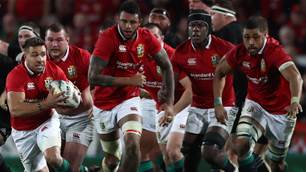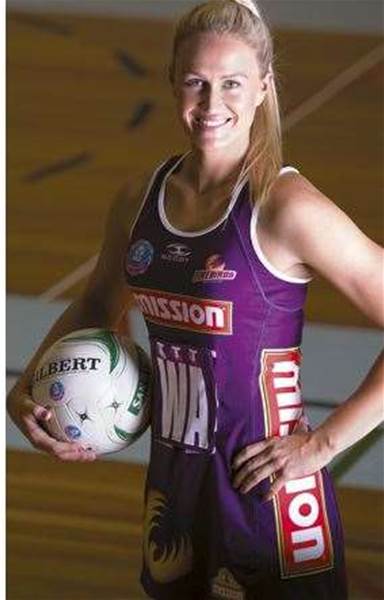Middle management can cop a bad rap in the corporate world – as a popular hangout for aspiring work-shirkers, etc. But on a netball court, these staffers are the heavy-lifters.
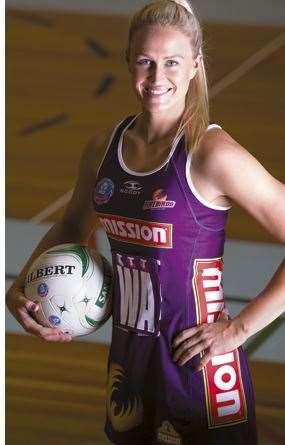 Middle management can cop a bad rap in the corporate world – as a popular hangout for aspiring work-shirkers, etc. But on a netball court, these staffers are the heavy-lifters. Fire the ball to their shooters and their work is done. Get that pass wrong, catching or throwing – even by millimetres – and there’s the possibility of a heartbreaking trip down the floor for their rivals.
Middle management can cop a bad rap in the corporate world – as a popular hangout for aspiring work-shirkers, etc. But on a netball court, these staffers are the heavy-lifters. Fire the ball to their shooters and their work is done. Get that pass wrong, catching or throwing – even by millimetres – and there’s the possibility of a heartbreaking trip down the floor for their rivals.
Australia’s midcourt has been in good hands the last few years, thanks in part to Sydneysider Chelsea Pitman. The 181cm wing attack’s debut Trans-Tasman ANZ Championship season in 2010 was cut short by one of those wretched ACL injuries, but she was able to bounce back in the best possible fashion, proving an important part of the Queensland Firebirds’ recording-breaking undefeated run to the title in ’11. That campaign sky-rocketed Pitman to national team duties, and she hasn’t looked back, collecting 12 Test caps since.
By now it’s an experienced head that Pitman, a nursing university student away from the court, carries around on her 24-year-old shoulders. There are always plenty of unknowns in netball, but one thing she knows for sure coming into a campaign of seven Tests for the Diamonds (five against the Kiwis and two against Malawi) is that she won’t be donning her gold skirt on game night without a fight from her ultra-competitive national squad-mates. Here, she takes Inside Sport through her training commitments for her domestic team, those mighty Queensland Firebirds.
MAD MONDAY
“We’ll start the week with a strength gym session; Monday is an upper-body weights day. We’ll do our warm-up, or pre-hab, which we also call the animal warm-up, because our trainer Brynley Abad makes us do ‘spidermans’, ‘caterpillars’, ‘hurdles’ and the ‘monkey’ – we literally have to warm up like monkeys; get down and pretty much act like monkeys, make noises and everything ... It’s entertaining for us, anyway.
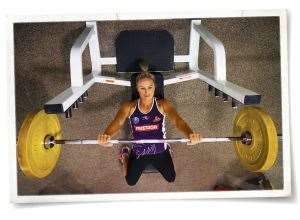 “Then we head into our supersets, which will be incline dumbbell press, with ... It’s always a push and a pull with our supersets. So we’re doing a pushing exercise and then a pulling exercise. Everyone has a different program. Everything is individualised depending on where you need improvements.
“Then we head into our supersets, which will be incline dumbbell press, with ... It’s always a push and a pull with our supersets. So we’re doing a pushing exercise and then a pulling exercise. Everyone has a different program. Everything is individualised depending on where you need improvements.
“Personally, because I can put on strength and muscle very easily, I only have to do three sets. Our trainer always wants heavier lifting, so we’re doing three sets of three-to-five reps. Bryn wants us fatiguing on the fifth one, so if we can lift six, we’re lifting too light. He literally wants you struggling to lift it every time. Our supersets might include an incline bench, then a seated row, then a normal bench press with chin ups, and then a bench pull with a bent-over or prone row.”
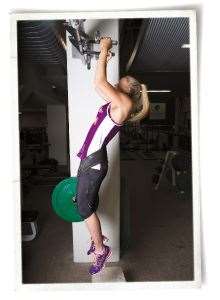 COURT IN SESSION
COURT IN SESSION
“We have three court work sessions a week, each lasting two hours. On Monday nights there’s a bit of specialist work involved. We have a shooting coach, a mid-court coach, who is also our assistant coach, and then we have Roselee Jencke, our head coach. She obviously oversees everyone, but will take the defenders because she’s a very good specialist defence coach. We’ll split up for about 20 minutes for our zone-specific training. From there our attackers will link with the mid-court. All the while the defenders will still be working, but they like to poach little attackers here and there to ... abuse, I guess! When the defence needs attackers, you know those attackers are going to get double-defended, and that the attacker is going to get killed for that session. But it’s really good. We love it. If you show them up when you’re getting double-defended, it’s great.”
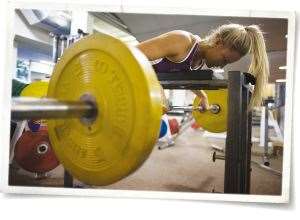 TIME-OFF TUESDAY
TIME-OFF TUESDAY
“I’ll go and do hot yoga or something on an off day. It just makes me feel so relaxed. It’s yoga for an hour in a room heated to 32 degrees. It’s different to Bikram, which is in 42-degree heat and can last for an hour and a half. My flexibility has improved completely from hot yoga, my awareness of my body and what’s tight has gotten better. I walk out of there happy and refreshed and relaxed. Hot yoga makes sure you concentrate on yourself and listen to your body. They’re so relaxed about it where I go. You can go to some yoga classes where they’re extremely strict. It’s like, ‘Don’t have a sip of water until we tell you you can have a sip of water!’ Flexibility is such a big thing for me because I’m always so tight with the way I train. I’ll go do hot yoga and have a deep-tissue massage in the morning, then rush off to uni.”
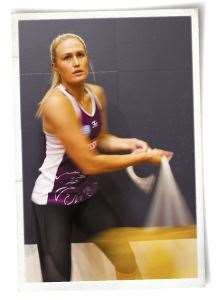 WEDNESDAY WEIGHTS
WEDNESDAY WEIGHTS
“It’s always an extremely hard day. We start about 3.45pm and finish at 6.30pm. We do strength work, then court work. The strength session is a ‘45-minute-get-in-there-get-out’, working our legs. Because of my knees – I’ve }had a reco and clean-out on my left and two clean-outs on my right – I’ll do single-leg squatting, super-set with a box jump. You have to make sure you’re landing lightly; you don’t want to land like an elephant. You’re using proprioception landing, which is making sure you’re bending your knees correctly, taking care of them and your ankles. The box jumps get our fast-twitch muscles going. Counteracting with the heavy weights, you’re jumping and you’re springing. You’re doing five reps of those
over three sets. You’re leg pressing, box jumping and single-leg squatting. If you’re getting to say, six reps, then your weights
are too light. Again, our trainer would prefer to see us fatiguing and just doing four in the middle with much heavier weights than see us do more reps than he’s asked.”
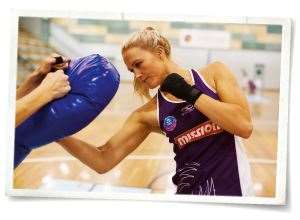 WEDNESDAY NIGHT OUT
WEDNESDAY NIGHT OUT
“This court work session is a lot of running through the team we’re coming up against, how they play. Our attackers will pretend to be the team we’re playing next and the defenders have to try and beat us and then vice-versa. Say we’re playing a New Zealand team, the defenders put on a specific type of zone and we’ll have to try and break it.
So there’s a lot of stopping, starting and talking through the specifics of how we’re going to beat this team and how they play.
“Because there’s a lot of talking, our trainer is around and runs us through what we call top-ups. We’ll finish doing our netball stuff in groups, then each row will have a 15-minute block, and then it’ll be like, ‘Alright, let’s go and do a fitness component.’ It’s either shuttles or runs outside the court on the massive hill ... We’ll do 15 sets of hill runs, so we’re literally fatiguing, and then we come back in and usually do ten to 15 long-courts, where you’ve got seven girls on the court and you bring it from the defence end, to the attacking end, to the goal. You’ve just done fitness, you’ve done a top-up, you’re absolutely buggered, and then you have to go and complete these long-courts!”
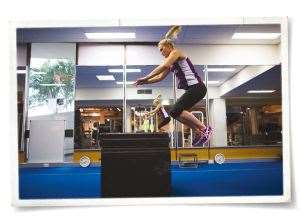 KNEEDY THURSDAY
KNEEDY THURSDAY
“I make sure I go to physio on Thursday. I’ll do 20 minutes of pilates with him as well. He just watches it and tells me what I need to be focussing on. It’s not like the pilates that I guess people go and do in classes. It’s specific to what my body needs. My hip-alignment needs to be perfect. I have to make sure they’re activated and switched on for me to get the most out of my knees without them hurting. If my hip’s out, my knee hurts. If my glute isn’t switching on properly, my knee will hurt. Just little things like that.
Depending on how I feel, I might do a boxing session on Thursday as well.”
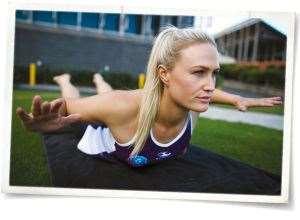 FINALISING FRIDAY
FINALISING FRIDAY
“This is our final court work session leading into a game. It’s pretty much a combined session of what we do on a Monday and Wednesday. It’s a full two hours of hard yakka. We like to have a team word every week that’s going to be our trigger word on the court. In a recent game against the Swifts, our word was ‘hunger’. We were out there, hungry for it, we were going to be the first person there to dropped balls no matter what ... We were literally going to be so dominant, hungry out there and we wanted it so badly ... We could feel it within the team. So on the Friday we’ll focus on our little goals and what we want to work on in our units. The shooters will suggest five goals they want to achieve, then centre court, then defence, and then we talk about what we need to do as a whole to win.”
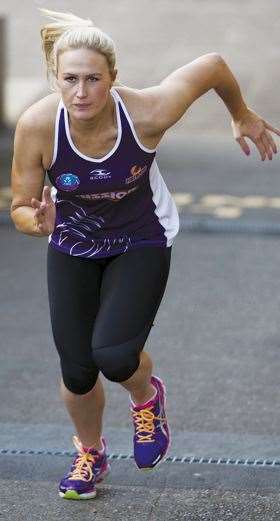 GAME-DAY SATURDAY
GAME-DAY SATURDAY
“We’re free-rein to do whatever we want – shopping, time with family, ensure we have our nutrition plan in place. Friday is the last time we train. If it’s an away game, we train in the morning for an hour – a captain’s run. It’s so we can go to the venue where we’re going to play, familiarise ourselves with the changing rooms, the court, and because we’ve travelled, obviously just get our legs loosened, go through our match-day warm-up, pass the ball around, let the shooters have a few shots at goal. If there’s anything specific we individually want to work on, we can grab a chat with the coach and go and spend ten minutes on it – break into a bit of a sweat and that’s it. When we’re at home, because we know our home court and we haven’t travelled and we don’t feel the effects of fatigue, we just rock up to the changing room about an hour and a half
before the game.”
AN AUSSIE DIAMOND AMONGST DIAMONDS
“Preparing with the Diamonds is completely different to Firebirds duty. There are a lot more court work components – you’re on the court every single day. For the last World Champs here we had six weeks to prepare together – some build-ups are even shorter. Last year the team management started something new by taking a squad of 15 away and every single week they’d re-select a team of 12. Everyone is vying for a position in that 12, let alone a position in the starting side.
“You learn so much in such a short time because you’re around the best netball players in the world. If you’re not learning anything in that environment, there’s something wrong with you, because even the best can learn something. The older, more experienced players can definitely learn things from the new girls coming through. You need to know that learning never stops.”
– James Smith
Photos by Krystle Wright
Related Articles

Caslick named in the Seven Great Tries of the Sydney Sevens
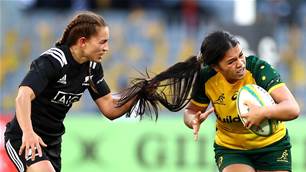
Official 2021 Rugby World Cup dates announced
